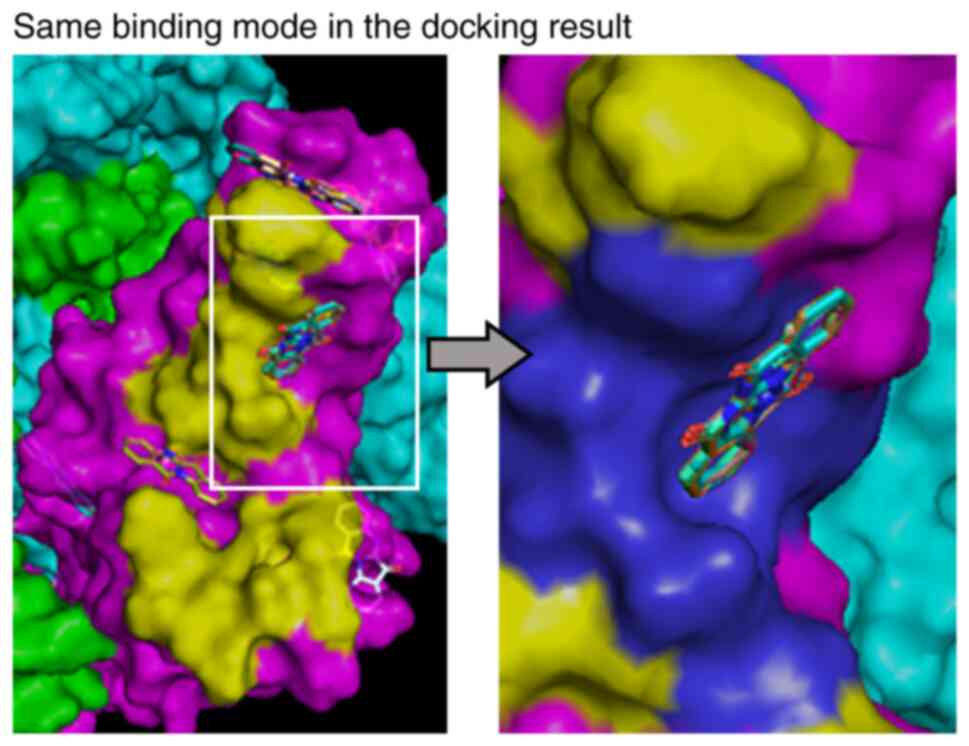|
1
|
Huang C, Wang Y, Li X, Ren L, Zhao J, Hu
Y, Zhang L, Fan G, Xu J, Gu X, et al: Clinical features of patients
infected with 2019 novel coronavirus in Wuhan, China. Lancet.
395:497–506. 2020.PubMed/NCBI View Article : Google Scholar
|
|
2
|
Walls AC, Park YJ, Tortorici MA, Wall A,
McGuire AT and Veesler D: Structure, function, and antigenicity of
the SARS-CoV-2 spike glycoprotein. Cell. 181:281–292.e6.
2020.PubMed/NCBI View Article : Google Scholar
|
|
3
|
Wrapp D, Wang N, Corbett KS, Goldsmith JA,
Hsieh CL, Abiona O, Graham BS and McLellan JS: Cryo-EM structure of
the 2019-nCoV spike in the prefusion conformation. Science.
367:1260–1263. 2020.PubMed/NCBI View Article : Google Scholar
|
|
4
|
Zhong Y, Yoshinaka Y, Takeda T, Shimizu N,
Yoshizaki S, Inagaki Y, Matsuda S, Honda G, Fujii N and Yamamoto N:
Highly potent anti-HIV-1 activity isolated from fermented
Polygonum tinctorium Aiton. Antiviral Res. 66:119–128.
2005.PubMed/NCBI View Article : Google Scholar
|
|
5
|
Ishihara T, Okura T, Kohno K, Tanimoto T,
Ikegami H and Kurimoto M: Polygonum tinctorium extract
suppresses nitric oxide production by activated macrophages through
inhibiting inducible nitric oxide synthase expression. J
Ethnopharmacol. 72:141–150. 2000.PubMed/NCBI View Article : Google Scholar
|
|
6
|
Han NR, Kang SW, Moon PD, Jang JB, Kim HM
and Jeong HJ: Genuine traditional Korean medicine, Naju Jjok
(Chung-Dae, Polygonum tinctorium) improves
2,4-dinitrofluorobenzene-induced atopic dermatitis-like lesional
skin. Phytomedicine. 21:453–460. 2014.PubMed/NCBI View Article : Google Scholar
|
|
7
|
Tsai YC, Lee CL, Yen HR, Chang YS, Lin YP,
Huang SH and Lin CW: Antiviral action of tryptanthrin isolated from
Strobilanthes cusia leaf against human coronavirus NL63.
Biomolecules. 10(366)2020.PubMed/NCBI View Article : Google Scholar
|
|
8
|
Hosokawa Y, Hagiyama M, Iino T, Murakami Y
and Ito A: Noncontact estimation of intercellular breaking force
using a femtosecond laser impulse quantified by atomic force
microscopy. Proc Natl Acad Sci USA. 108:1777–1782. 2011.PubMed/NCBI View Article : Google Scholar
|
|
9
|
Hagiyama M, Yabuta N, Okuzaki D, Inoue T,
Takashima Y, Kimura R, Ri A and Ito A: Modest static pressure
suppresses columnar epithelial cell growth in association with cell
shape and cytoskeletal modifications. Front Physiol.
8(997)2017.PubMed/NCBI View Article : Google Scholar
|
|
10
|
Kimura R, Otani T, Shiraishi N, Hagiyama
M, Yoneshige A, Wada A, Kajiyama H, Takeuchi F, Mizuguchi N,
Morishita K and Ito A: Expression of cell adhesion molecule 1 in
human and murine endometrial glandular cells and its increase
during the proliferative phase by estrogen and cell density. Life
Sci. 283(119854)2021.PubMed/NCBI View Article : Google Scholar
|
|
11
|
Koma Y, Furuno T, Hagiyama M, Hamaguchi K,
Nakanishi M, Masuda M, Hirota S, Yokozaki H and Ito A: Cell
adhesion molecule 1 is a novel pancreatic-islet cell adhesion
molecule that mediates nerve-islet cell interactions.
Gastroenterology. 134:1544–1554. 2008.PubMed/NCBI View Article : Google Scholar
|
|
12
|
Mimae T, Okada M, Hagiyama M, Miyata Y,
Tsutani Y, Inoue T, Murakami Y and Ito A: Upregulation of notch2
and six1 is associated with progression of early-stage lung
adenocarcinoma and a more aggressive phenotype at advanced stages.
Clin Cancer Res. 18:945–955. 2012.PubMed/NCBI View Article : Google Scholar
|
|
13
|
Lan J, Ge J, Yu J, Shan S, Zhou H, Fan S,
Zhang Q, Shi X, Wang Q, Zhang L and Wang X: Structure of the
SARS-CoV-2 spike receptor-binding domain bound to the ACE2
receptor. Nature. 581:215–220. 2020.PubMed/NCBI View Article : Google Scholar
|
|
14
|
Tang XP, Guo XH, Geng D and Weng LJ:
d-Limonene protects PC12 cells against corticosterone-induced
neurotoxicity by activating the AMPK pathway. Environ Toxicol
Pharmacol. 70(103192)2019.PubMed/NCBI View Article : Google Scholar
|
|
15
|
Rabi T and Bishayee A: d-Limonene
sensitizes docetaxel-induced cytotoxicity in human prostate cancer
cells: Generation of reactive oxygen species and induction of
apoptosis. J Carcinog. 8(9)2009.PubMed/NCBI View Article : Google Scholar
|
|
16
|
Shankar GM, Alex VV, Nisthul AA, Bava SV,
Sundaram S, Retnakumari AP, Chittalakkottu S and Anto RJ:
Pre-clinical evidences for the efficacy of tryptanthrin as a potent
suppressor of skin cancer. Cell Prolif. 53(e12710)2020.PubMed/NCBI View Article : Google Scholar
|
|
17
|
Han NR, Kim HM and Jeong HJ: Tryptanthrin
reduces mast cell proliferation promoted by TSLP through modulation
of MDM2 and p53. Biomed Pharmacother. 79:71–77. 2016.PubMed/NCBI View Article : Google Scholar
|
|
18
|
Crackower MA, Sarao R, Oudit GY, Yagil C,
Kozieradzki I, Scanga SE, Oliveira-dos-Santos AJ, da Costa J, Zhang
L, Pei Y, et al: Angiotensin-converting enzyme 2 is an essential
regulator of heart function. Nature. 417:822–828. 2002.PubMed/NCBI View Article : Google Scholar
|


















